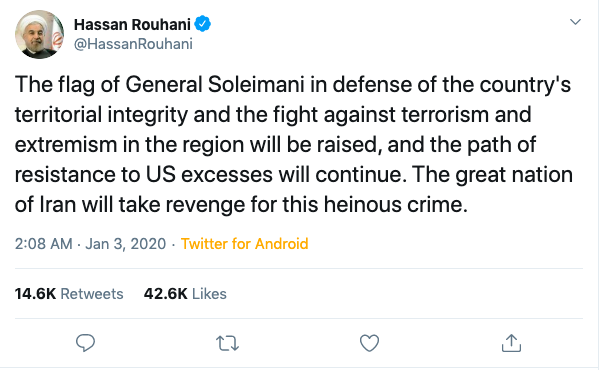WW3 (possibly)
On the order of President Trump on January 3, 2020, the United States successfully killed the head of Iran’s Islamic Revolutionary Guard Corps, Major General Qassem Soleimani. This assassination sent the internet and American-Iranian relations into a tailspin.
“[The conflict] has heightened tensions not only between the US and Iran but also between the US and some of our European allies who have been working to find a peaceful resolution to the nuclear question with Iran,” AP government teacher Kurt Gates said.
The United States has a long and complicated history with Iran dating back to the 1850s. Relations were relatively peaceful until the 1970s when the US Embassy Hostage Crisis occurred. Ever since then, Iranian-American political and social relations have been strained. In more recent years, due to the rise in popularity of social media networks like Twitter and Facebook, understanding the conflict and the two countries’ relationship has become tricky. Mass media had a huge roll in the impact of news distribution and presentation after the drone strike. Biased news sources were quick to either praise or criticize Trump, while unprejudiced sources reported strictly on facts.
“Although some sources provided quick, detailed, and accurate information to actually inform the American public, many posted knee-jerk editorials bashing the administration’s actions without doing any impact analysis. The Trump administration killed a known human-rights abuser and a man who attacked his own people as well as ours and many in the media suddenly began calling for an all-out war. How, pray tell, would Iran engage in an all-out war when the United States currently possesses over six thousand nuclear warheads, has several more in a deployable stockpile and has sanctioned Iran in the past to the point where they’re months away from developing their first warhead? They couldn’t, and the media’s desire to post anything contrary was despicable and indicative of an age where outrage, not truth, sells.” national debate finalist and senior Katherine Brown said.
Iranian citizens have taken to the streets, protesting the Iranian government’s rule and calling for the regime’s leader to resign. President Trump has largely supported the Iranian protests.
“To the brave and suffering Iranian people: I have stood with you since the beginning of my presidency and my government will continue to stand with you… We are following your protests closely. Your courage is inspiring,” President Trump said in a Tweet on January 11.
Not all of the responses have been positive, though. While social media has been used to encourage Iranians to protest, some Iranians have called their youth without ‘honor’. The Iranian president took to Twitter the day of the attack and issued a warning.
“The flag of General Soleimani in defense of the country’s territorial integrity and the fight against terrorism and extremism in the region will be raised, and the path of resistance to US excesses will continue. The great nation of Iran will take revenge for this heinous crime,” Iranian President Hassan Rouhani tweeted on January 3.
Social media has also largely desensitized the situation in Iran, as America’s youth has resorted to using humor to react. Between memes, Tik Toks, and social media posts, the conflict has seemingly become nothing more than a joke.
“It’s kind of dehumanized it for me. I love seeing all the WW3 memes on Twitter and Instagram, I think they are really funny. However, I kind of forget if there was a war that started between us and Iran, the Iranian people would suffer the most because the war would be over in the Middle East,” senior Bih Awasom said.
Some students saw the initial reaction as troubling. For Brown, the reaction rang as a clear reminder as to why older generations don’t take student protests seriously, and as to why so many young people seem apathetic or careless.
“It [reaction to the crisis via social media] disheartened me for this generation. Every single Tik Tok I saw on this conflict focused on how teenagers perceived they were going to be affected in the form of a draft. Not only is it ignorant, it’s insensitive. If we truly had been on the verge of World War 3 (which we weren’t even close to), making memes is one of the worst reactions. It’s this type of attitude and behavior that undermines all of the positive advocacy our generation has been attempting to stand for. How can we expect the older generations to legitimize our climate strikes, gun protests, campaign work, women’s marches, or ever our religiously motivated protests if our first reaction to an international event is dancing in front of our phones and making videos about getting “drafted”. Some even attempted to justify their creations by saying they’re “coping mechanisms”. Coping with what exactly? These were clearly not done out of a place of ideological cleansing, healing, or centering but rather out of ignorant reactionism.” Brown said.


